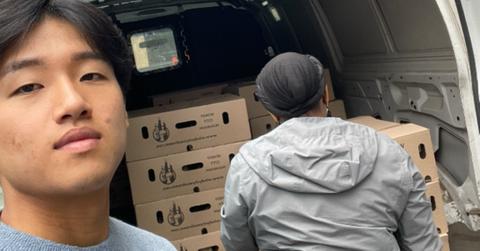Unlikely Journey Into the Backrooms of the Chicago Food Scene
In a world focused on loud launches and viral apps, it’s easy to overlook the quiet builders who keep the backbone of industry running.
Published June 24 2025, 7:30 p.m. ET

Mushrooms aren’t just a popular ingredient. They're also part of a surprisingly manual supply chain. At a local farmer’s market in Chicago, one distributor was still managing orders through email, creating invoices by hand, and tracking inventory on a whiteboard. The operation, despite supplying top restaurants across the city, relied on outdated systems and time-consuming processes.
For Unyoung “Wes” Kim, meeting a mushroom distributor at a local farmer’s market became a turning point in how he thought about technology. When Kim visited the distributor’s facility, he saw firsthand how outdated many of the processes were. Orders were taken through email, invoices were created manually, and inventory was tracked on a whiteboard.
Kim realized there had to be a more efficient way to handle these tasks. By spending time on-site and understanding the day-to-day work, he started building simple tools to improve the process. Over time, these tools helped modernize a part of the food supply chain that had been overlooked by technology.
A Slow But Impactful Journey
Kim understood that he couldn’t create change without truly understanding these industries. That philosophy led him to spend time riding in delivery trucks and packaging mushrooms so he could then co-build simple tools that made the daily grind more efficient.
Kim believes in using AI not to disrupt for the sake of novelty, but to make a meaningful impact. His passion for innovation ultimately led him to design everything from backend systems that feed entire cities to systems for streamlining essential healthcare operations.
The Quiet Approach to Tech Development
Many founders want to create as much noise as possible with tools like showy consumer apps. Yet Kim believes that many traditional industries have long been overlooked by technological development. He noticed that these sectors are in desperate need of modernization.
So, Kim decided to take matters into his own hands and develop solutions that these companies were more than happy to pay for, as long as they effectively solved their problems. He’s not in it for notoriety. Instead, Kim silently observes behind the scenes to develop methodical solutions from a place of understanding.
Kim Doesn’t Need Recognition to Succeed
The latest social media app developments aren’t the tools that truly impact life. Behind-the-scenes work keeps industries running. Just because you can’t see its impact doesn’t mean it’s not there, and that also goes for the people who develop these systems.
Kim doesn’t need recognition. He’d rather get his hands dirty to have an authentic understanding of these industries’ pain points. Through that process, he’s developed multiple long-lasting systems tailored to each business’s individual needs. From healthcare claim denials to converting email orders into invoices, Kim knew that there was a better approach, and he was determined to find it without displacing people.
Using Technology to Assist, Not Replace
Technology can be an industry-changer, but only if companies work with it rather than using it as a replacement for the humans that drive every aspect of daily life. Kim isn’t interested in replacing labor. He wants to automate mundane, repetitive tasks that consume time and energy, freeing up resources for the things that truly make a difference.
This change didn’t come easily, as longstanding industries are often resistant to change. It took some convincing when Kim pitched using AI to small businesses while still a student. But with a bit of humility and trust, he could give every business owner access to tech-based efficiency gains that make their work both easier and more efficient.
The Unsung Heroes of Innovation
In a world focused on loud launches and viral apps, it’s easy to overlook the quiet builders who keep the backbone of industry running. Kim demonstrates that genuine innovation can sometimes be found by listening, learning, and creating where no one is watching. His work serves as a reminder that significant change often begins not in boardrooms or tech expos, but in delivery trucks, handwritten ledgers, and overlooked systems. And while others chase headlines, Wes Kim is exactly where transformation begins.